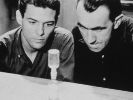Eye For Film >> Movies >> Le Trou (1960) Film Review

Escape films have a lengthy and robust history, from the likes of La Grande Illusion (on which Jacques Becker, a long-time colleague of Jean Renoir, worked as assistant director) through to The Great Escape and Papillon to the The Shawshank Redemption. Among them, Becker's final film, Le Trou (The Hole), stands out as one of the greats of the genre, exemplifying his eye for character and detail, married, unlike some of his other films, to a simple but strong plot.
These days, every other film seems to have been 'inspired by real life' but this one is particularly immersed in the realm of true story, in that not only was it based on a real prison break from La Santé Prison, documented in a book by José Giovanni (who adapts with Becker and Jean Aurel), but it also stars one of his fellow would-be escapees Jean Keraudy. In a bid to highlight the film's authenticity, Becker went on to fill out most of his key cast with, at that time, non-professionals - Michel Constantin, Philippe Leroy and Raymond Meunier - with the new kid on the cell block, in a choice that serves to further mark out his difference from the others, being played by professional Marc Michel. In case the audience are in any doubt, Becker even has Keraudy break the fourth wall at the start of the film, directly introducing the action to the audience and explaining that it is his story.

The lean plot concerns a cell of four inmates - practical leader Roland (Keraudy), cheeky chap Monseigneur (Meunier), laid back wit Geo (Constantin) and suspicious Manu (Leroy) - who are part way through a plan to break out of the prison when a fifth criminal is assigned to their room. There's something wet-behind-the-ears about Claude (Marc Michel) from the start, a certain softness to his (actor-ly) features that the others don't possess, that even the prison governor seems to notice, underlined when we learn he is, essentially, a kept man, less in prison by design than accident.
As always, Becker takes his time, stuffing us, with the men, in their cramped cell, his measured pace serving to emphasise their close quarters, in particular, a minute or so when one of them urinates in the toilet in the corner of the room as the others sit just feet away - underscoring their inescapable closeness.
They are masking their escape plan with a towering stack of cardboard. Under the cover of building work elsewhere in the jail, they drag the pile to one side and begin to hammer at the cement floor with a disconnected piece of bed post, doggedly continuing even with the threat of discovery, adopting an almost fatalistic attitude to their attempt.
The carefully established confined surroundings generate tension, enhanced by the sort of details Becker excels at, such as the methodical way the guards search their cell during a spot check, or the matter of fact manner in which every food item they are sent is systematically cut open and searched. The cell also contrasts with the comparative wide open space of the sewer system they plan to use to escape, labyrinthine and equally threatening in its expansiveness.
The script is spartan but the close proximity to the actors most of the time means that we see every nuance of body language and gesture. Becker also immerses us in the minutiae of their escape, such as the mirror they attach to a toothbrush handle to give them a periscopic view of the corridor outside their cell or the careful construction of an hourglass so they can keep track of the time once they start to dig in the sewers.
The most compelling aspect of the film is it's sheer physicality. We don't just imagine how hard it must be to hack through concrete, we see it as Becker lets - or more accurately, makes - us watch, aware minutes are passing by and a guard could arrive at any time, as the men hack away at the unyielding concrete. Later, we feel the passage of time again as they bash at a wall, the act initially seeming futile, the sweat and exertion clearly visible in a way that fakery can never imitate. What is noticeable is how few 'set piece' moments of danger there are in the film - replaced for the most part by a clammy sense of general dread that these men, who we have grown to like as much for their stoicism and ingenuity as anything else, will be caught. They don't miraculously clean up either, as Becker makes a point of showing them desperately scrubbing off any tell-tale signs of dirt.
It would be a capital crime to spoil the ending of this film but it is satisfying in terms of plot and emotional sentiment, showing that perhaps the hardest prisons to escape from are the ones we unwittingly, perhaps unavoidably, construct for ourselves.
Reviewed on: 25 Aug 2017
















